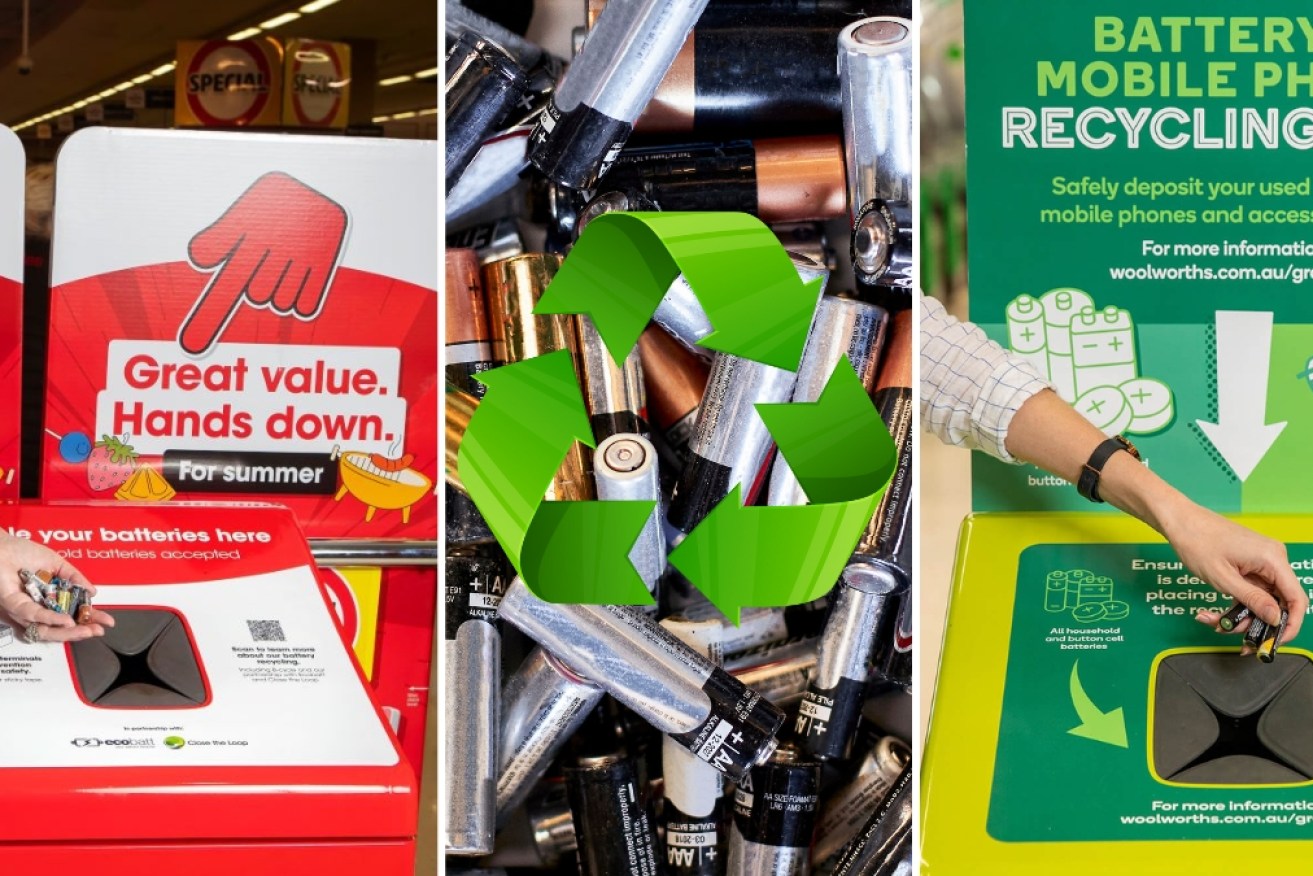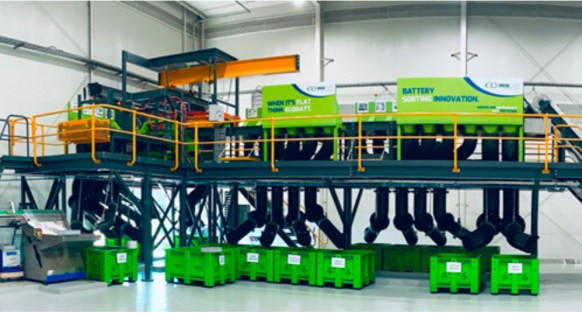Retailers on path to redemption as millions of kilos of batteries recycled


There's some good reasons why battery drop-off points are popping up around the country. Photo: TND/Getty/Coles/Woolworths
Retailers are renewing efforts to deal with one of Australia’s most dangerous waste streams, by giving consumers what they say is a “safe and effective” way to dispose of our growing stockpile of used batteries.
Coles has hit a big milestone in the great battery recycling boost, announcing last week it had installed almost 850 battery recycling bins at its supermarkets across the country.
They join thousands of other battery drop-off points in Australia, with major outlets such as Woolworths, Aldi, IGA, Bunnings and Mitre 10 on board.
A Coles spokesperson said batteries represented a growing waste problem, and the retailer wanted to provide a “safe, convenient and effective way” for consumers to recycle batteries.
Coles’ bins take any brand of AA, AAA, C, D, button cell and rectangular six and nine-volt batteries.
“With so many batteries going to landfill every year when disposed of in general waste and household recycling bins, this initiative helps to gives batteries a second life and drives our transition to a circular economy,” the spokesperson said.
A Woolworths spokesperson said offering a convenient place to drop off batteries as part of customers’ shopping helped prevent batteries going to landfill and reduced potentially dangerous stockpiles at home.
An IGA spokesperson said the company encouraged its independent stores to offer battery recycling, while an Aldi Australia spokesperson said the retailer had recycled more than 1300 tonnes of batteries since it introduced Australia’s first national supermarket program in 2013.
Bunnings director of merchandise Jen Tucker said the big hardware chain had recycled more than 300 tonnes of household and power tool batteries collected at its Australian and New Zealand stores over more than two years.
Stringent checks in place across recycling scheme
However, consumers can perhaps be forgiven for some scepticism.
More than a year after the spectacular collapse of the supermarket-driven REDcycle’s soft plastic recycling scheme, can Australians trust these battery programs?
In 2022, REDcycle was forced to admit it had been storing, not recycling, soft plastics that customers had dropped off in good faith at major supermarkets for recycling.
But there is cause for more confidence in the burgeoning battery recycling programs.
Coles, Woolworths, Aldi, IGA, Bunnings, Mitre 10 and Big W are among the 33 retailers accredited by B-cycle.
B-cycle, run by the Battery Stewardship Council, is an industry-led product stewardship scheme authorised by the Australian Competition and Consumer Commission and accredited as a product stewardship scheme by the federal government.
Compared to the privately-owned REDcycle, B-cycle has had to meet higher standards before it received government approval.

An example of a battery recycling facility. Photo: Ecobatt
B-cycle and Battery Stewardship Council CEO Libby Chaplin told The New Daily retailers accredited by B-cycle did not have to have battery drop-off points.
But those that did must adhere to a code of practice that outlines the importance of working with an accredited collector to provide a safe drop-off location for customers.
From there, the responsibility is on accredited collectors such as Ecobatt and Close the Loop to manage battery stockpiles and take them to recycling facilities.
Chaplin said the criteria to be accredited as a collector or recycler by B-cycle were “quite strict”. Companies must demonstrate they have the capability and capacity to collect and recycle batteries.
This is confirmed by an annual audit, conducted by an independent third-party engaged by B-cycle.
Chaplin said B-cycle’s governance structure also differed from the failed REDcycle.
“The requirement from a retail drop-off point is that there is chain of custody from the point of pick up, so [collectors] need to demonstrate either through a geotagged photograph or a consignment note that a container of batteries has been picked up,” she said.
“That’s then taken to a sorting facility, where there is another check and balance, and then it’s processed. The audit that we conduct once a year goes in and verifies the evidence of that.”
Battery recycling also has an advantage over soft plastic recycling in that there’s “extreme demand” for metals found in most batteries.
More than 70 per cent of materials recycled from batteries collected under the B-cycle scheme in the previous financial year were reused, including new batteries, agricultural fertilisers and construction materials.
Environmental and safety benefits of recycling batteries
In 2022-23, more than two million kilograms of batteries were collected for recycling under B-cycle’s scheme.
The participation of everyday Australians is vital for that to increase further.
When B-cycle launched in 2022, 63 per cent of Australians said they disposed of batteries in the kerbside general waste and recycling bins; that number has since fallen to 55 per cent.
Chaplin said batteries should never be thrown away in home rubbish bins.
This is largely because batteries contribute to a huge amount of waste, with the CSIRO finding in 2020 that Australia produces about 3300 tonnes of lithium-ion battery waste each year.
Lithium-ion batteries, found in an increasing range of products from laptops to e-scooters, also present a huge safety hazard.
After several cases of lithium-ion battery induced-fires, the ACCC last year called on the federal government to develop ways for the batteries to be safely disposed of, as well as increase safety measures for consumers.

Two backpackers were lucky to escape when a faulty e-bike battery ignited a blaze in a Sydney hostel in 2023. Photo: FRNSW
“If they’re crushed, which is what actually happens inside a rubbish truck, they can self-ignite and then cause a fire in the truck,” Chaplin said.
“If it actually goes to a recycling facility and gets damaged or crushed in that process, it can cause a fire in a recycling facility.
“In both of those cases, obviously, there is a risk to the workers, but it’s also very expensive. And ultimately, it’s us as consumers and communities that are paying for those services through our rates.
“The key message that we want to get across is never toss your batteries in kerbside waste or recycling bins. We also really encourage people to tape the battery terminals [shut] for safety – that reduces the risk of fire.”








